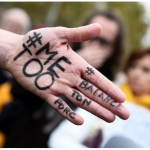“This is a moment where people will not turn their heads when something is wrong,” says Pamela Craig, a former Accenture PLC finance chief who sits on the boards of Merck & Co. and Akamai Technologies Inc. and is foundation chair at C200, a women’s leadership organization. “We need to make it a watershed.” –WSJ

A healthy work environment is only possible when leaders ensure accountability at every level for ethical treatment of employees, including their own, and the accountability loop around sexual harassment and abuse that has been open for far too long is finally beginning to close. Women are feeling safe enough to say #metoo, and some women are publically identifying prominent men in society who have harassed them, in hopes of empowering others. The recent revelations in the entertainment industry have created a ripple effect that has reached Congress and beyond. And it is only the tip of the iceberg, as a recent CNN article indicated the majority of women who have served in US congressional offices have said it has happened to them too.
Issues of sexual harassment are part of a broader set of gender dynamics that are too often viewed solely as women’s issues. Where is the accountability of men –individually and as a group? What is the culture we have grown up in that has allowed us as men to perpetrate such harmful behavior by allowing it to continue without intervening? Shouldn’t we be holding ourselves and our male colleagues to a higher standard?

It is a mistake to only look at these recently exposed men through the lens that their behavior exists in a vacuum; that they are simply the anomaly of a sick, rich, arrogant individual who abuses their power. Similarly, when mass shootings are perpetrated by white men, the focus is almost always on the pathology of the individual, whereas, when shootings are committed by non-white men, we quickly assume they are linked to our minority communities, terrorist groups, or foreign cultures.
The current focus on harassment presents an opportunity for us as men to look in the mirror and consider the consequences of our conditioning. Many of us have never contemplated that we were raised in a culture that objectifies women, with a “conquest” mentality. As a result, tolerating abuse of women becomes a precondition of remaining in the club and not being cast out by our male friends. The result: in the US about one in five women are raped, and the rate of harassment in the workplace is much higher.
So how do we create a culture where men gain status by interrupting and calling out inappropriate behavior? A female friend told me a story of being in the Air Force long ago, where a supervisor told her things would be easy for her if she got very friendly with him. When she refused he made life difficult for her, forcing her to come in and work weekends. The men in her group came in too and told him if she works, they work, and the supervisor stopped. I want every woman to experience that kind of support . This abuse of power and privilege affects all of us, and it’s not acceptable to leave the enforcement to women.
In many of these cases that are coming to light in the past months or so, other men knew about the behavior and did nothing. How many opportunities did they have to speak up and interrupt, and how did their silence enable the behavior to continue, and escalate? It’s time to close our accountability loop with each other.
Photo credit: PHOTO: BERTRAND GUAY/AGENCE FRANCE-PRESSE/GETTY IMAGES




